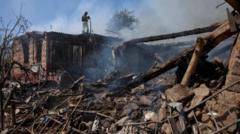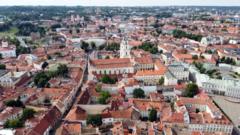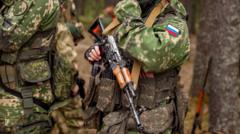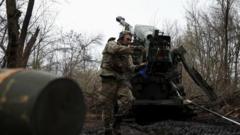Amidst challenges, President al-Shara calls for international cooperation to stabilize Syria.
Syria's New Era: President Ahmed al-Shara Seeks Global Support

Syria's New Era: President Ahmed al-Shara Seeks Global Support
The former rebel leader navigates the complexities of post-civil war geopolitics.
As Syria enters a new phase following years of civil conflict, President Ahmed al-Shara, a former rebel leader, is actively seeking international support to stabilize his administration and rejuvenate the nation’s economy. Speaking exclusively to The New York Times, al-Shara outlined his strategic efforts to secure foreign partnerships in a complex geopolitical landscape.
Victory against President Bashar al-Assad's regime last December marked a significant turning point for al-Shara, yet with new leadership comes heightened expectations. No longer reliant solely on regional powers like Turkey, al-Shara is now faced with the pressing need for endorsements from Western nations, particularly the United States, to mitigate the debilitating economic sanctions that currently weigh heavily on Syria.
Al-Shara emphasizes that the key to achieving stability lies not just in lifting sanctions, but also in obtaining military assistance to form a robust national defense. "To prevent a return to civil war," he stated, "we must build a new army with the right support." Recognizing the intertwined destinies of the region, al-Shara warned that instability in Syria poses risks that reverberate throughout the Middle East and beyond.
His calls for international assistance extend to economic support, highlighting the necessity for foreign investments to function as a lifeline for public services. "Only through cooperation can we ensure that Syria does not descend into chaos, which would ultimately impact the whole world," he cautioned during the interview conducted at the presidential palace in Damascus.
As he navigates these challenges, al-Shara remains committed to uniting fractured alliances while striving to foster an environment conducive to peace and reconstruction. With the eyes of the world upon him, the new president is set on the path of diplomacy—a crucial move to ensure Syria does not fall back into turmoil.
Victory against President Bashar al-Assad's regime last December marked a significant turning point for al-Shara, yet with new leadership comes heightened expectations. No longer reliant solely on regional powers like Turkey, al-Shara is now faced with the pressing need for endorsements from Western nations, particularly the United States, to mitigate the debilitating economic sanctions that currently weigh heavily on Syria.
Al-Shara emphasizes that the key to achieving stability lies not just in lifting sanctions, but also in obtaining military assistance to form a robust national defense. "To prevent a return to civil war," he stated, "we must build a new army with the right support." Recognizing the intertwined destinies of the region, al-Shara warned that instability in Syria poses risks that reverberate throughout the Middle East and beyond.
His calls for international assistance extend to economic support, highlighting the necessity for foreign investments to function as a lifeline for public services. "Only through cooperation can we ensure that Syria does not descend into chaos, which would ultimately impact the whole world," he cautioned during the interview conducted at the presidential palace in Damascus.
As he navigates these challenges, al-Shara remains committed to uniting fractured alliances while striving to foster an environment conducive to peace and reconstruction. With the eyes of the world upon him, the new president is set on the path of diplomacy—a crucial move to ensure Syria does not fall back into turmoil.





















